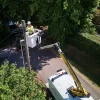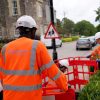Government Prep £10m Pilot of 1Gbps Full Fibre Broadband for 6 UK Areas
The Government has chosen a Sunday to announce that they’ve committed £10m from a new fund to launch 6 local pilots of “full fibre” (FTTP/H) broadband / Ethernet networks, which aims to “test innovative ways” of using the service to connect businesses, homes and public sector sites.
The test is being funded by a pot of £200 million that was set aside during the Budget 2017 announcement in March (here), which at the time pledged to help “fund a programme of local projects to test ways to accelerate market delivery of new full-fibre broadband networks” (e.g. connection vouchers, aggregated demand schemes, opening access to existing public sector infrastructure).
Budget 2017 Extract
Full-fibre broadband – Starting in 2017, the government will invest £200 million to fund a programme of local projects to test ways to accelerate market delivery of new full-fibre broadband networks. These will combine the following approaches:
• bringing together local public sector customers, to create enough broadband demand to reduce the financial risk of building new full-fibre networks.
• offering full-fibre broadband connection vouchers for businesses, to increase take-up of services where new networks are built through the programme.
• directly connecting public sector buildings, such as schools and hospitals. This will bring fibre closer to more homes and businesses, allowing them to be connected.
• opening up public sector assets, such as existing ducts, to allow fibre to be laid more cheaply.
The remaining £190 million is due to be spent by 2020-21 and how that money is invested will no doubt depend upon the outcome of the above pilots. Sadly we don’t get a lot of detail about the pilots themselves, although we are at least told which areas they will occur in.
Advertisement
The 6 Pilots Areas
* Aberdeen and Aberdeenshire
* West Sussex
* Coventry and Warwickshire
* Bristol and Bath & North East Somerset
* West Yorkshire and Greater Manchester
It’s interesting to note that some providers already have 1Gbps capable networks serving public sector sites and businesses in some of these locations, such as Cityfibre’s deployment in Aberdeen (here). Not to mention that traditional leased lines are already deployed by many other networks in similar areas.
The fact that the pilots appear to be at least partly targeted at urban areas suggests that, due to EU State Aid rules, solutions related to connection vouchers may dominate. Using public money in urban areas is difficult because those usually aren’t places that are deemed to suffer from market failure or a lack of private investment, but vouchers are more targeted than a general network build and thus avoid some of the legal issues.
We should point out that the fund itself appears to be open to both urban and rural areas. The press release also mentions “homes“, although the language appears to be firmly focused on business and public sector sites.
Andrew Jones MP, Exchequer Secretary to the Treasury, said:
“How we live and work today is directly affected by how good our broadband connection is. Reliable connections enable new industries to flourish, help create jobs and give people flexibility in how and where they work.
For our economy to thrive, it is vital we make smart investments to ensure our digital infrastructure is world class and fit for the future.
Full fibre connections are the gold standard and we are proud to announce today the next step to get Britain better connected.”
Matt Hancock MP, Digital Minister, said:
“We want to see more commercial investment in the gold standard connectivity that full fibre provides, and these innovative pilots will help create the right environment for this to happen. To keep Britain as the digital world leader that it is, we need to have the right infrastructure in place to allow us to keep up with the rapid advances in technology now and in the future.”
In keeping with today’s announcement the Government has also published a summary of responses to their related Call for Evidence on Extending Local Full Fibre Networks (here), which received 125 submissions from communications providers, local bodies and other interested parties. However this is a very general summary of opinions and doesn’t really give us a lot of new information.
Advertisement
On top of that the Government has also published the outcome of a new study (here) into the impact of their earlier Connection Voucher Scheme on businesses across the UK. The scheme gobbled £81m+ of public funding and approved grants for 54,000+ SME businesses (15,000 in Greater London alone) across 50 UK city areas, enabling them to install a “superfast broadband” (30Mbps+) service via individual vouchers worth up to £3,000 (here).
Sadly the above scheme came to an end in October 2015, after the funding dried up (here), although naturally the Government are keen to highlight its successes and the aim will be to replicate or build on those. A similar voucher level of £3,000 is also likely for the new scheme, not least since the cost of FTTP/H deployments has come down since the original effort and related ISPs are becoming more common.
Key Findings of the Voucher Study
• 42,500 small firms were able to substantially improve their internet connection: on average new services were 18 times faster.
• The UK benefited by at least £8 for every £1 spent.
• One in four firms employed an extra full time member of staff and each made an average of £1,300 more profit per annum, through being more efficient and effective, and providing more reliable and faster delivery of goods and services.
• Over 6,000 firms pooled their voucher with others in group schemes to get ultrafast connections at guaranteed speeds in areas previously prohibitively expensive and at reduced ongoing costs.
• The scheme encouraged competition and consumer choice with 87% of funding going to smaller suppliers providing specialised services (average voucher value of £2,304), while only 13% of the funding went to the top 3 of BT, Virgin Media and TalkTalk (average voucher value of £438).
We should point out that some local authorities already have various different broadband voucher schemes of their own, such as the £2.8m Connect Westminster project in London or the Ultrafast Connectivity Voucher scheme in Wales. Any future scheme will likely complement those, although so far we’ve been given no solid detail about how the new scheme will work but this should become clear once more info. has been released.
UPDATE 4th Sept 7:09am
Advertisement
Some of the initial feedback and coverage that we’ve seen appears to confirm that a number of the pilots will be adopting the voucher scheme approach and most likely at a similar level to the previous one (up to £3,000). Bristol, which is one of the pilot areas, seems to be expecting to launch a voucher scheme to help businesses and this will go live by early November 2017. West Yorkshire also has a similar ambition.
All of this is despite the Government officially saying that the scope of the pilot(s) has yet to be finalised. The vouchers will also be open to all sorts of different operators, which is good because as we said above there are plenty of 1Gbps capable FTTP/H alternatives to Openreach, albeit mostly in urban areas.
Mark is a professional technology writer, IT consultant and computer engineer from Dorset (England), he also founded ISPreview in 1999 and enjoys analysing the latest telecoms and broadband developments. Find me on X (Twitter), Mastodon, Facebook, BlueSky, Threads.net and Linkedin.
« Openreach Reduces 100Mbps and 1Gbps Ethernet Access Direct Prices

















































Comments are closed